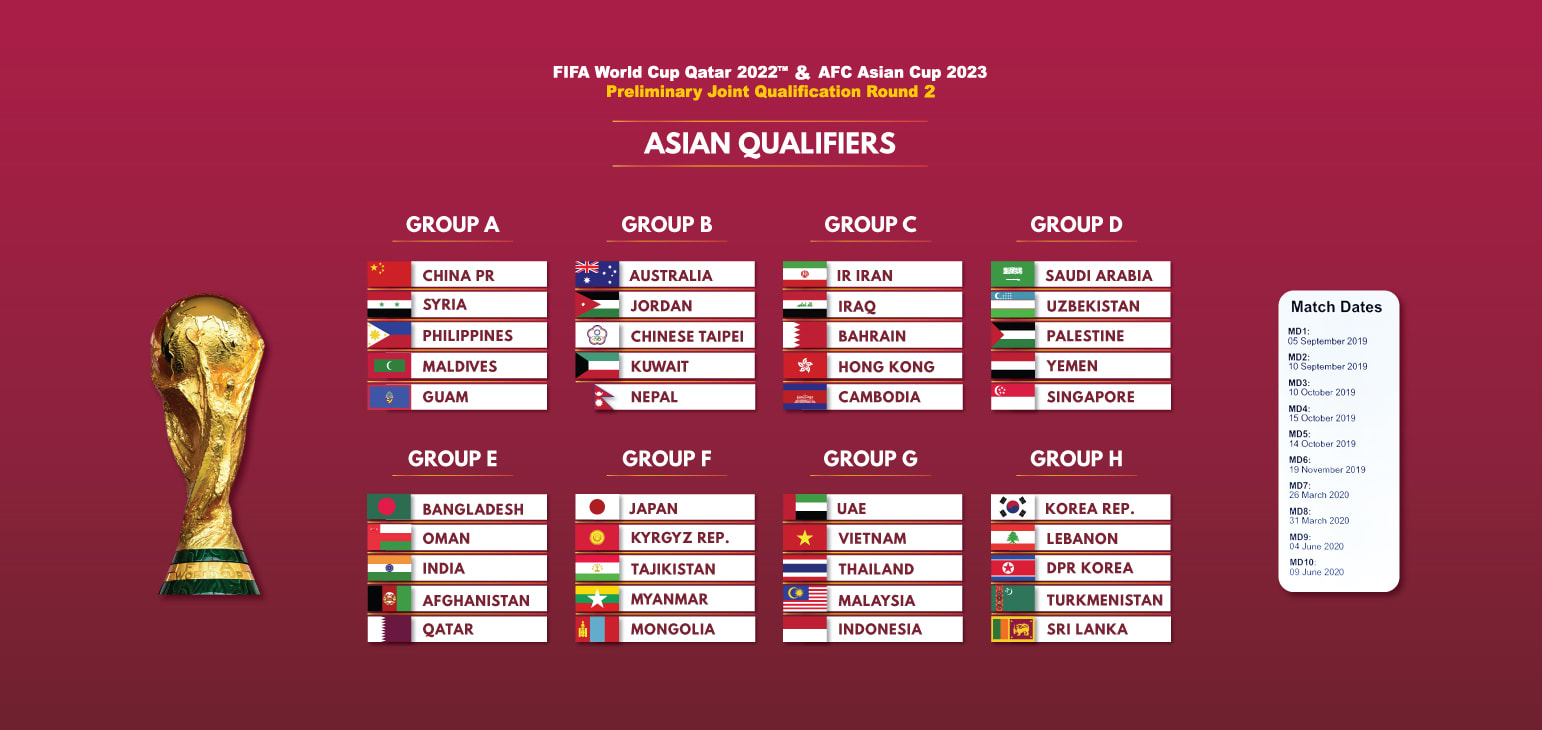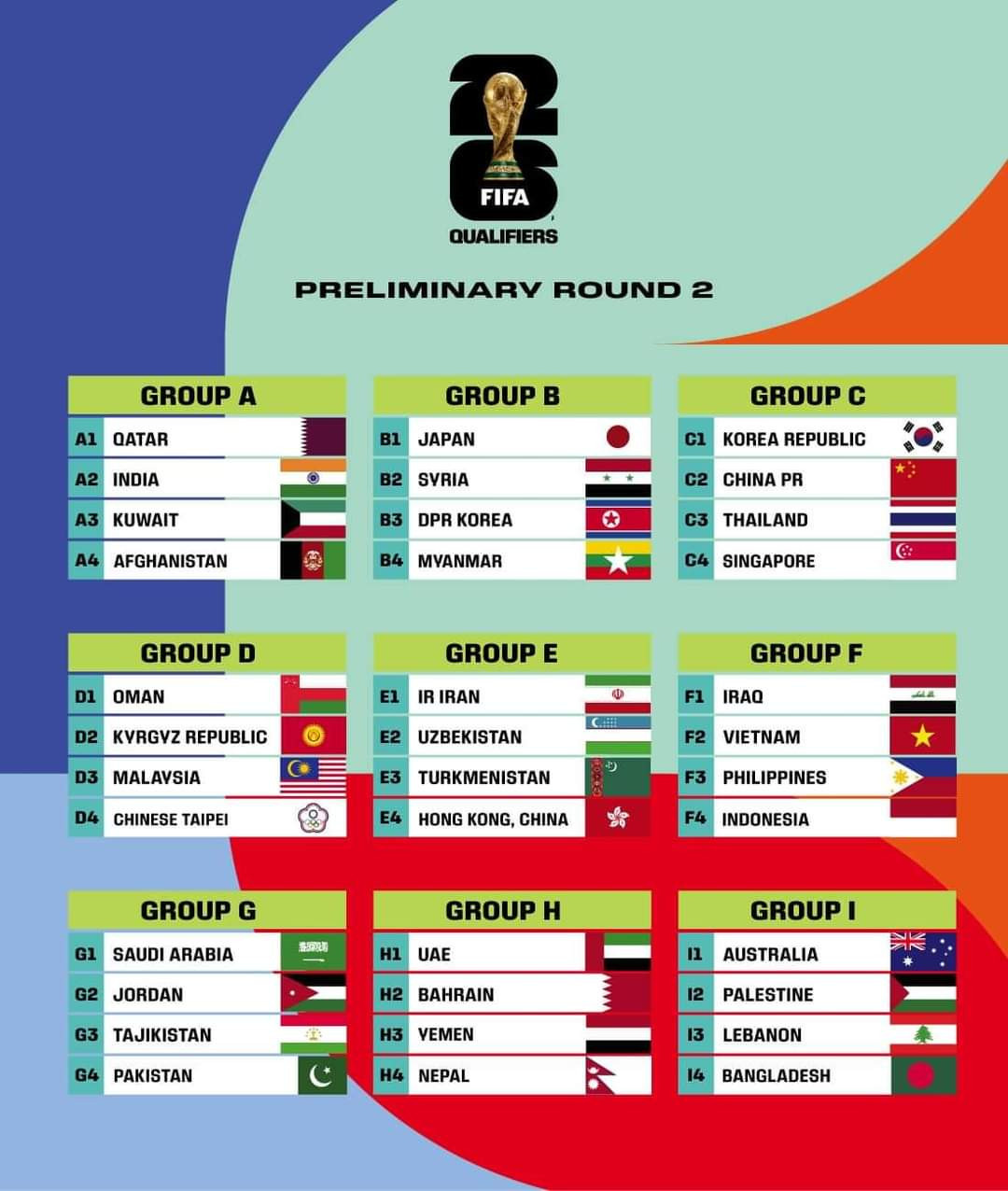
Garuda’s Grand Odyssey: Charting Indonesia’s World Cup Qualifiers Schedule
The roar of the Gelora Bung Karno Stadium is not merely the sound of a crowd; it is the collective heartbeat of a nation obsessed with football. In Indonesia, the beautiful game transcends sport – it is a unifying force, a source of immense national pride, and a perpetual wellspring of hope. For decades, that hope has been channeled into a singular, fervent dream: to see the Merah Putih, the red and white flag, unfurl on the grandest stage of them all, the FIFA World Cup.
While Indonesia famously participated in the 1938 World Cup as the Dutch East Indies, becoming the first Asian team to do so, the modern nation has endured a long and often arduous journey in its quest to return. Each qualification campaign is met with renewed optimism, a fresh slate for the "Garuda" (the national team’s nickname, derived from the mythical eagle in Indonesian folklore) to prove their mettle against Asia’s finest. The current 2026 FIFA World Cup qualifiers represent perhaps their most promising endeavor yet, fueled by a strategic push for player development, the integration of diaspora talent, and the tactical acumen of a visionary coach.
This article delves into Indonesia’s ambitious path through the AFC World Cup qualifiers, outlining the intricate schedule, the challenges faced, the triumphs celebrated, and the unwavering spirit that drives the team and its millions of passionate supporters.
The AFC Qualification Maze: Understanding the Format
Before diving into Indonesia’s specific journey, it’s crucial to understand the multi-stage format of the AFC World Cup Qualifiers. With the expansion of the World Cup to 48 teams in 2026, Asia’s allocation has increased significantly, offering more slots and, theoretically, more opportunities for nations like Indonesia.
- First Round: The lowest-ranked AFC teams play two-legged ties. Winners advance.
- Second Round: The winners from the first round join the remaining higher-ranked teams, forming nine groups of four. Each team plays home and away matches against their group opponents. The top two teams from each group (18 teams in total) advance to the Third Round and also qualify directly for the 2027 AFC Asian Cup.
- Third Round: The 18 teams are drawn into three groups of six. Each team plays home and away matches. The top two teams from each group (six teams in total) qualify directly for the FIFA World Cup.
- Fourth Round (AFC Play-off): The third and fourth-placed teams from each of the three Third Round groups (six teams in total) are drawn into two groups of three. Teams play single round-robin matches at a centralized venue. The winners of each group (two teams) qualify directly for the FIFA World Cup.
- Fifth Round (Inter-Confederation Play-off): The two second-placed teams from the Fourth Round play a two-legged tie. The winner advances to the inter-confederation play-off tournament, where they will compete against teams from other confederations for a final World Cup spot.
This complex structure highlights the endurance, tactical flexibility, and squad depth required to navigate the qualification process. For Indonesia, every match is a final, every point invaluable.
Indonesia’s Current Campaign: The Second Round Crucible
Indonesia’s journey in the 2026 qualifiers began with a relatively straightforward passage through the First Round, where they convincingly defeated Brunei Darussalam with an aggregate score of 12-0. This set the stage for their entry into the more challenging Second Round, where they were drawn into Group F alongside regional giants Iraq, familiar rivals Vietnam, and the Philippines.
Group F Standings (as of early June 2024 – prior to final June matches):
| Rank | Team | Played | Won | Drawn | Lost | GF | GA | GD | Points |
|---|---|---|---|---|---|---|---|---|---|
| 1 | Iraq | 4 | 4 | 0 | 0 | 12 | 1 | +11 | 12 |
| 2 | Indonesia | 4 | 2 | 1 | 1 | 6 | 6 | 0 | 7 |
| 3 | Vietnam | 4 | 1 | 0 | 3 | 2 | 5 | -3 | 3 |
| 4 | Philippines | 4 | 0 | 1 | 3 | 1 | 9 | -8 | 1 |
Indonesia’s current position in second place is a testament to their improved performances, particularly against Vietnam. The initial match against Iraq, a 5-1 away defeat, served as a stark reminder of the quality gap with Asia’s elite. However, subsequent results, including a crucial 1-0 away win against Vietnam and a dominant 3-0 home victory over the same opponent, showcased the team’s progress and tactical discipline under coach Shin Tae-yong. A 1-1 draw against the Philippines away also proved to be a vital point earned on the road.
The Crucial Remaining Second Round Schedule:
The fate of Indonesia’s Second Round campaign hinges entirely on the final two matchdays in June 2024. These fixtures are effectively "must-win" encounters, especially the home game, to secure a spot in the Third Round.
-
Matchday 5:
- Date: June 6, 2024
- Fixture: Indonesia vs. Iraq
- Venue: Gelora Bung Karno Stadium, Jakarta, Indonesia
- Significance: This is arguably Indonesia’s biggest match of the Second Round. A home victory against the group leaders would not only avenge their earlier defeat but also put them in a commanding position to qualify. Even a draw could be valuable, depending on other results. The atmosphere at GBK is expected to be electric, with the Indonesian faithful providing an intimidating "12th man."
-
Matchday 6:
- Date: June 11, 2024
- Fixture: Indonesia vs. Philippines
- Venue: Gelora Bung Karno Stadium, Jakarta, Indonesia
- Significance: While the Philippines are at the bottom of the group, they managed to hold Indonesia to a draw in the reverse fixture. Indonesia cannot afford complacency. This match could be the decider for their qualification, especially if the Iraq game doesn’t go entirely their way. A home victory here is absolutely paramount to seal their progression.
The Garuda’s Architect: Shin Tae-yong’s Impact
Much of Indonesia’s recent resurgence can be attributed to the meticulous planning and unwavering discipline instilled by South Korean coach Shin Tae-yong. Appointed in 2019, Shin has embarked on a multi-pronged strategy:
- Physicality and Fitness: Shin prioritizes peak physical condition, often putting players through grueling training regimes to ensure they can compete for the full 90 minutes, especially against physically superior opponents.
- Tactical Discipline: He has implemented a more structured and adaptable tactical approach, moving away from the often-individualistic style of the past. The team now exhibits better defensive organization and more coherent attacking patterns.
- Youth Development: Shin has shown immense faith in young talent, integrating promising players from the U-20 and U-23 national teams into the senior squad, such as Marselino Ferdinan, Pratama Arhan, and Rafael Struick.
- Diaspora Integration: Crucially, Shin has actively sought out and successfully lobbied for the naturalization of players of Indonesian descent playing in European leagues. This has brought a significant injection of quality, experience, and professionalism to the squad. Key players like Jordi Amat (Malaysia Super League, formerly La Liga), Elkan Baggott (Ipswich Town), Sandy Walsh (KV Mechelen), Shayne Pattynama (KAS Eupen), Thom Haye (SC Heerenveen), Ragnar Oratmangoen (Fortuna Sittard), and Jay Idzes (Venezia) have elevated the team’s overall standard, especially in defense and midfield.
These strategic shifts have made Indonesia a more competitive and formidable opponent, capable of challenging established Asian football powers.
The Road Ahead: A Glimpse into the Third Round (If Qualified)
Should Indonesia successfully navigate the Second Round and secure a top-two finish in Group F, they would advance to the Third Round, a significantly tougher stage.
- Format: Three groups of six teams, with each team playing 10 matches (home and away) over approximately a year.
- Timeline: The Third Round matches are typically scheduled from September 2024 through June 2025.
- Opponents: This is where Indonesia would face Asia’s true heavyweights – nations like Japan, South Korea, Iran, Australia, Saudi Arabia, Qatar, and Uzbekistan. The quality, tactical sophistication, and physical prowess of these teams would represent a monumental step up.
- The Schedule Grind: Playing 10 high-stakes matches over a year demands immense squad depth, consistent performance, and the ability to manage injuries and fatigue. Travel across Asia would also be a significant factor.
Hypothetical Third Round Schedule (Illustrative – Dates and Opponents TBD upon qualification and draw):
- Matchday 1: Early September 2024 (Home/Away vs. Group Opponent 1)
- Matchday 2: Mid-September 2024 (Home/Away vs. Group Opponent 2)
- Matchday 3: Early October 2024 (Home/Away vs. Group Opponent 3)
- Matchday 4: Mid-October 2024 (Home/Away vs. Group Opponent 4)
- Matchday 5: Mid-November 2024 (Home/Away vs. Group Opponent 5)
- Matchday 6: Late March 2025 (Home/Away vs. Group Opponent 1)
- Matchday 7: Early June 2025 (Home/Away vs. Group Opponent 2)
- Matchday 8: Mid-June 2025 (Home/Away vs. Group Opponent 3)
- Matchday 9: Early September 2025 (Home/Away vs. Group Opponent 4)
- Matchday 10: Mid-September 2025 (Home/Away vs. Group Opponent 5)
Beyond the Third Round (The Final Hurdles):
Should Indonesia achieve the extraordinary feat of finishing in the top two of their Third Round group, they would secure direct qualification. However, if they finish third or fourth, their journey would continue to the Fourth Round (AFC Play-off), and potentially the Fifth Round (Inter-Confederation Play-off). These stages involve fewer matches but are incredibly high-pressure, often single-leg or two-legged knockout ties where one mistake can end the dream.
The Challenges and the Dream
Indonesia’s World Cup qualification campaign is not without its significant challenges:
- Consistency: Maintaining high levels of performance throughout a long campaign is crucial.
- Squad Depth: Injuries and suspensions can severely test the team’s depth, especially with players scattered across different leagues.
- Tactical Evolution: Opponents will analyze Indonesia’s game, requiring Shin Tae-yong to continuously evolve his tactics.
- Mental Fortitude: The pressure from a football-mad nation can be immense. The players must maintain focus and resilience.
- Quality Gap: While closing, a gap still exists between Indonesia and Asia’s absolute elite in terms of league quality, infrastructure, and player development pathways.
Yet, these challenges are dwarfed by the magnitude of the dream. For a nation of over 270 million people, a World Cup appearance would be more than just a sporting achievement; it would be a profound moment of national unity, a global declaration of Indonesia’s presence on the world stage, and an unparalleled source of inspiration for future generations of footballers.
Conclusion: A Nation Holds Its Breath
Indonesia’s 2026 World Cup qualifiers schedule is a meticulously planned, yet inherently unpredictable, roadmap towards footballing glory. From the passionate cauldron of Gelora Bung Karno to the tactical battles waged on foreign soil, every match is a chapter in the Garuda’s grand odyssey. The team, under the astute guidance of Shin Tae-yong and bolstered by a blend of local talent and naturalized stars, is arguably better equipped than ever to navigate this demanding path.
As June 2024 approaches, the nation holds its breath. The final two Second Round matches are not just games; they are the gateway to the next, even more challenging, phase of this historic quest. The dream of the Merah Putih waving proudly in the World Cup stadiums of North America is alive, palpable, and driving every kick, every tackle, and every cheer. The journey is arduous, but for Indonesia, the pursuit of this dream is, in itself, a victory.



